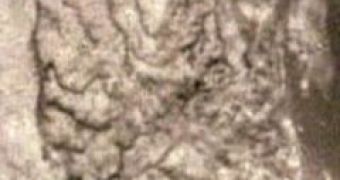If you're thinking of taking a trip to the lake, this is no place to go. If you'll try to start a campfire, all you're going to get is a huge blast. No, we're not talking about some highly polluted lake on Earth, but about something quite different. It looks like scientists may have discovered a methane lake, and it's located on Titan, one of Saturn's moons.
The team in charge of analyzing the images sent by NASA's Cassini probe is fascinated by dark shape 235km by 75km in the moon's southern polar region, which resembles remarkably a lake, with smooth, shore-like boundaries unlike any seen previously on Titan.
According to Dr. Elizabeth Turtle, Cassini imaging team associate at the University of Arizona, as reported by The Planetary Society, "This feature is unique in our exploration of Titan so far. Its perimeter is intriguingly reminiscent of the shorelines of lakes on Earth that are smoothed by water erosion and deposition."
"It's possible that some of the storms in this region are strong enough to make methane rain that reaches the surface. Given Titan's cold temperatures, it could take a long time for any liquid methane collecting on the surface to evaporate. So it might not be surprising for a methane-filled lake to persist for a long time" said Cassini imaging team member Dr. Tony DelGenio of NASA's Goddard Institute for Space Studies in New York.
However, for now, these are only speculations, because the feature might not be a lake at all, but simply a broad depression filled by dark, solid hydrocarbons falling from the atmosphere onto Titan's surface. In this case, the smooth outline might be the result of a process unrelated to rainfall, such as a sinkhole or a volcanic caldera.
Up until now, the Cassini probe hasn't been able to capture images that confirm or deny the presence of surface liquids on Titan. However, seeing that thirty-nine more Titan flybys are planned for Cassini's prime mission, the science teams will search for opportunities to observe the lake feature again and to look for mirror-like reflections from smooth surfaces elsewhere on Titan, which would represent a definite proof supporting the presence of liquids.
Well, given these circumstances?up for a bath, anyone?

 14 DAY TRIAL //
14 DAY TRIAL //